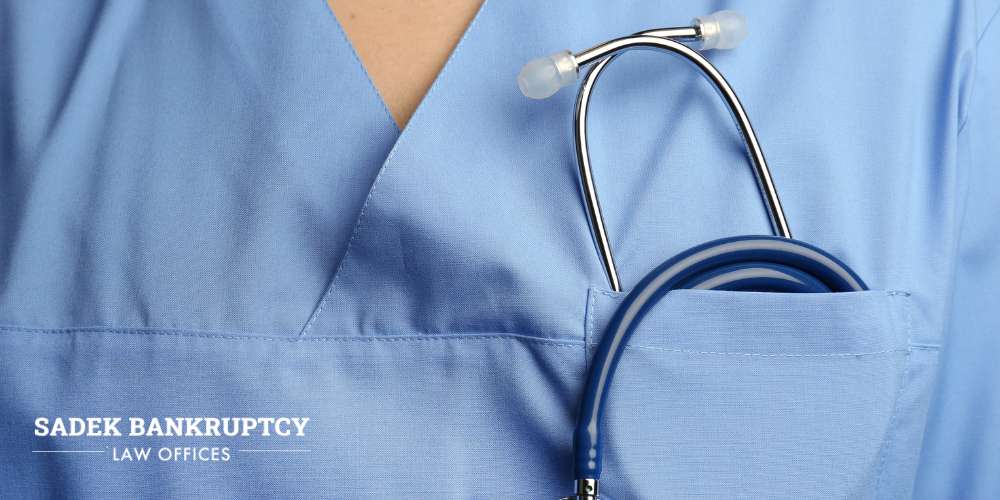When you’re struggling to keep up with your nursing school payments, looking for nurse debt relief options can seem overwhelming or even like a waste of time. Luckily, the debt relief professionals at Sadek Bankruptcy Law Offices have put together a comprehensive guide for those in Pennsylvania and New Jersey in search of student loan relief programs and options for nurses.
To explore the best debt relief options for your situation and take control of your financial future, speak to one of the Philadelphia bankruptcy lawyers on our team today. At Sadek Bankruptcy Law Offices, we’ll take a look at your specific situation and guide you through the available programs to help you find the most effective path for managing your student loans.
Ready to take the first step toward a debt-free future? Call our law firm to schedule a consultation with a member of our legal team. Call (215) 545-0008 to reach our Pennsylvania office or call (856) 890-9003 to reach our New Jersey office.
Are There Any Debt Relief Options for Nurses?

Yes, there are several student loan debt relief options available for nurses. These include federal programs as well as state-specific programs for Pennsylvania and New Jersey residents. If you are a nurse and are interested in seeking student loan forgiveness, student loan repayment, or filing for bankruptcy for student loan debt, contact a student loan debt relief lawyer at our law office today.
Why Do Nurses Need Debt Relief?
There are a lot of reasons why nurses may need debt relief after graduating from nursing school. These reasons can include the high cost of nursing education and the disparity between earnings and education cost. Below are some of the main reasons why having debt relief options is so important as nurses continue their careers in healthcare.
High Nursing Education Costs
A nursing degree is incredibly expensive, with tuition costs for nursing programs often exceeding tens of thousands of dollars. Additional expenses, such as textbooks, clinical fees, certification costs, and mandatory (often custom) uniforms, can further increase the financial burden.
As a result, many nursing students rely on loans to cover these costs, which can lead to substantial debt upon graduation. This debt can be challenging to manage, especially for new nurses entering the workforce with relatively modest starting salaries.
Earnings vs Education Costs for Nurses

Nurses often face a significant disparity between their education costs and earnings. The cost of nursing programs, including tuition and related expenses, can be substantial, often requiring substantial student loans. Despite this investment, starting salaries for nurses, while generally competitive, may not always align with the high costs of their education.
This gap can create financial strain as new nurses work to manage and repay their nursing education loans while establishing their careers.
Nursing Debt Relief Options
Nurses facing significant student loan debt have several debt relief options available to them, each tailored to different circumstances and career paths. These include federal and state loan forgiveness programs, income-driven repayment plans, and even bankruptcy. Below is a list of the various debt relief options available to nurses in Pennsylvania and New Jersey.
Public Service Loan Forgiveness (PSLF)
Public Service Loan Forgiveness (PSLF) is a federal program designed to encourage individuals to work in public service by offering student loan forgiveness. PSLF offers student loan forgiveness for nurses who have made 120 qualifying monthly payments under a qualifying repayment plan while working full-time for a qualifying employer. You can find more information on Public Service Loan Forgiveness on the Federal Student Loan website.
Do Nurses Qualify for PSLF?
Yes, nurses may be eligible for Public Service Loan Forgiveness, but only if they meet certain criteria. To qualify, nurses must work full-time for a qualifying not-for-profit organization, which includes non-profit hospitals, healthcare facilities, or government agencies. Additionally, they must make 120 qualifying student loan payments under a qualifying repayment plan, such as an income-driven repayment plan, while employed in a qualifying public service role.
Other Student Loan Forgiveness Programs
In addition to the above federal student loan forgiveness program, nurses with Perkins Loans (federal student loans awarded to those with substantial financial need) may be eligible for Perkins Loan cancellation for five years as a result of their work in healthcare.
The Perkins Loan program was discontinued in 2017 but healthcare workers who are still in debt as a result of these federal loans may be eligible for cancellation. Learn more about Perkins Loan cancellation on the Federal Student Aid website.
Student Loan Debt Repayment Programs

Alongside these student loan forgiveness programs, nurses in Pennsylvania and New Jersey can benefit from several student loan repayment programs aimed at alleviating their financial burden, typically in exchange for work in underserved areas.
In Pennsylvania, the Primary Care Loan Repayment Program offers repayment assistance to nurses working in Health Professional Shortage Areas (HPSAs) in exchange for a service commitment of two years of full- or part-time employment in a Health Professional Shortage Area (HPSA). Eligible nurses include certified registered nurse practitioners, certified nurse midwives, and physician assistants.
New Jersey provides the Primary Care Practitioner Loan Redemption Program, which offers up to $200,000 in loan repayment for nurses who work in state-designated underserved areas for at least two years. Applicants must reside in New Jersey, hold a license as a primary care provider, and be employed in a qualifying shortage area. Details and application information are available on the New Jersey Higher Education Student Assistance Authority website.
Nationwide, the Nurse Corps Loan Repayment Program helps nurses repay up to 60% of their unpaid loans for a two-year commitment at a critical shortage facility or eligible nursing school with the possibility of an additional 25% repayment for a third year. This program is open to licensed registered nurses, advanced practice registered nurses, and nurse faculty members with a degree from an accredited nursing school.
The National Health Service Corps (NHSC) Loan Repayment Program also provides up to $50,000 in loan repayment for a two-year service at designated NHSC sites in underserved areas. To qualify, nurses must be U.S. citizens or permanent residents, hold an active nursing license, and work full-time or part-time in a qualifying facility.
Filing Bankruptcy
While not traditionally associated with student loan relief, bankruptcy can be a viable debt relief option for nurses struggling with overwhelming financial burdens. Filing for bankruptcy, whether under Chapter 7 or Chapter 13, can provide nurses temporary relief by halting collection efforts and offering a structured path to manage or discharge certain debts, including student debt.
Though discharging student loans through bankruptcy is challenging and requires proving undue hardship, this option can offer some breathing room and a fresh start for nurses facing severe financial difficulties.
Chapter 7 Bankruptcy
Filing for Chapter 7 bankruptcy is a debt relief option that can provide nurses with significant financial relief as well as protection from creditors throughout the process. Chapter 7 bankruptcy involves the liquidation of a debtor’s non-exempt assets to pay off creditors, and it can discharge many types of unsecured debts, such as credit card balances and medical bills.
However, student loans are typically not dischargeable through bankruptcy unless the borrower can prove that repaying the loans would cause “undue hardship.” This is a difficult standard to meet, requiring a separate legal proceeding known as an adversary proceeding.
If a nurse can successfully demonstrate undue hardship, Chapter 7 bankruptcy may discharge their student loan debt, offering a fresh financial start. This process can be complex, if you are in significant debt and are considering filing for Chapter 7 bankruptcy to discharge your nursing school loans, consult with a bankruptcy attorney on our team to explore your eligibility and your legal options.
Chapter 13 Bankruptcy
Filing for Chapter 13 bankruptcy is another debt relief option that allows nurses to reorganize their debts into a manageable repayment plan, typically spanning three to five years. Unlike Chapter 7 bankruptcy, Chapter 13 does not discharge debt outright but allows the debtor to repay their obligations over time according to a court-approved plan.
For student loan debt, while Chapter 13 will not discharge the loans, it can offer temporary relief by halting collection actions and including the student loans in the repayment plan. This allows nurses to potentially reduce or delay their monthly payments on student loans during the repayment period, offering some breathing room and the chance to catch up on overdue payments.
At the end of the Chapter 13 plan, any remaining eligible debts under the plan may be discharged, but student loans typically remain unless the borrower separately qualifies for undue hardship discharge, which can be difficult in some situations. If you are struggling to make your monthly payment on your nursing school student loan, Chapter 13 bankruptcy may provide you with the pause needed to catch up on your overdue payments and develop a repayment plan that works for you and your financial situation.
Is Bankruptcy a Good Idea for Nurses Struggling with Debt?

Bankruptcy can be a viable option for nurses struggling with significant debt, offering benefits such as protection from creditors and the potential for debt discharge, in cases of clear financial hardship. There are a lot of reasons to file for bankruptcy, especially if you’re saddled with debt and you do not qualify for other student loan repayment or loan forgiveness programs.
For example, unlike other predatory debt relief options like debt consolidation, bankruptcy can discharge many types of unsecured debts, providing a fresh start. While it may seem helpful, debt consolidation only combines debts into a single payment without necessarily reducing the total debt. Also, the relief that bankruptcy offers can be particularly beneficial when dealing with overwhelming financial burdens, as bankruptcy halts collection efforts and provides legal protection from creditors.
Additionally, unlike loan forgiveness programs, which can be uncertain and dependent on changing legislation, bankruptcy offers a clear and defined process for managing and discharging debt, making it a more predictable path to financial relief. However, it is essential for nurses to consult with a bankruptcy attorney to understand the implications and determine if it is the right solution for their specific situation.
At Sadek Bankruptcy Law Offices, our experienced attorneys can help you carefully evaluate your nursing student loan relief options to find the most suitable course of action for your financial situation. We can help you decide whether or not bankruptcy is the right choice and can assist you in selecting the appropriate chapter of bankruptcy to file under based on your specific needs and goals.
Contact the Pennsylvania and New Jersey Debt Relief Professionals at Sadek Law Today
If you are a nurse practitioner, advanced practice registered nurse, other nurse faculty member, or another healthcare professional with significant student loan debt and you do not qualify for student loan forgiveness or repayment, consider hiring a bankruptcy lawyer at Sadek Bankruptcy Law Offices today.
Our dedicated professionals understand the complex nature of debt management and can guide you through every step of the bankruptcy process. Whether you need assistance with evaluating your options, filing for bankruptcy, or selecting the right chapter to suit your needs, our attorneys offer personalized support tailored to your unique situation.
Don’t let unpaid nursing education debt control your life–call our Pennsylvania number at (215) 545-0008 or our New Jersey number at (856) 890-9003 or contact us online to schedule an initial consultation with a bankruptcy attorney on our team today.





